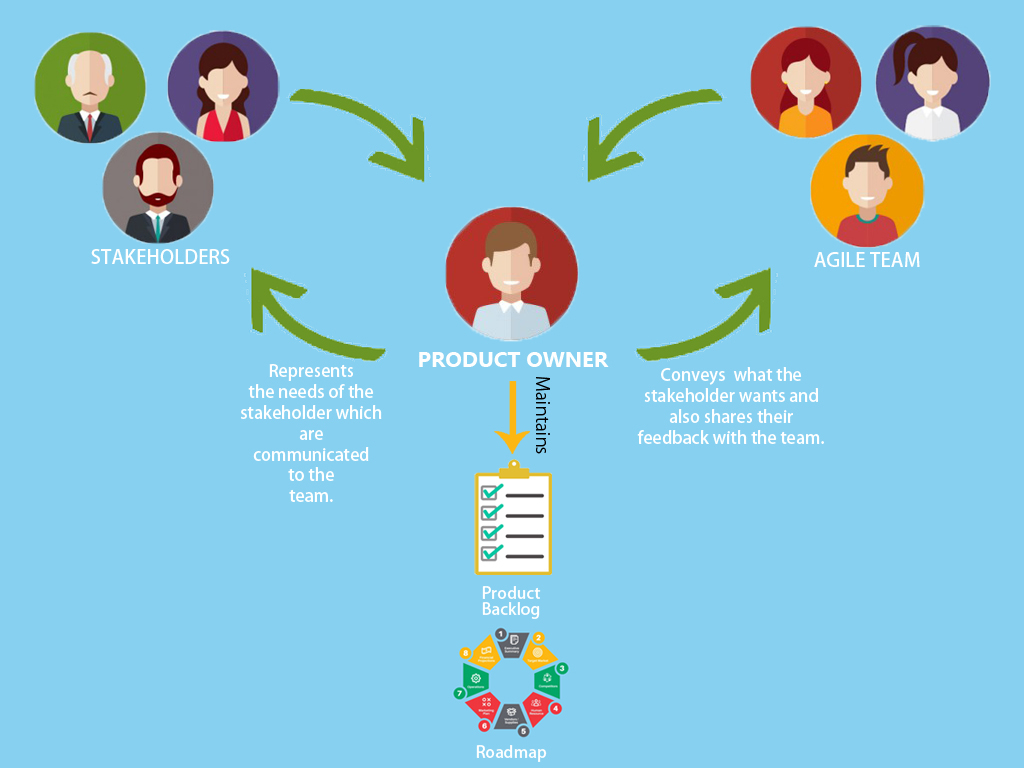Product Owner
A Product Owner represents the voice of stakeholders. Read more to recognize good Product Owners.
Who Is a Product Owner
Product Owner (PO) is responsible for maximizing the value of the product created by a Scrum Development Team. PO is the voice of the stakeholder (including customers) and defines what needs to be delivered. PO is also responsible for the Product Backlog and ensures that the backlog is visible and clear to the team. PO gives feedback to the developers and the stakeholders. PO decides what features will be in the product release in close collaboration with the developers and the customers. They do not have to be a part of just one team - if more teams work on the same project, the PO can be a member of all of those teams.
 Source: Yodiz: How The Product Owner Is Crucial For The Success Of An Agile Team
Source: Yodiz: How The Product Owner Is Crucial For The Success Of An Agile Team
A good Product Owner should:
- have the trust of the business leader paying for the project
- be a good communicator and should share the stakeholders’ needs with the team
- be able to use the software development tools
- know the MVP of the product
- attend the Sprint Retrospective meetings to know what has to be improved
- be responsible for defining the product roadmap (an overview of the important parts of the project)
- understand the basic product technology. It is not necessary to know every technical detail
- work closely with the DevOps Engineer
- ensure there is a clear understanding amongst the stakeholders and the Agile Team (developers)
- have a strong personality to be able to present their vision and stick to their opinion
Why You Might Want the Product Owner
A PO is responsible for the product and helps to develop it. The responsibility is also to catch possible problems related to the product. This role is critical to linking Agile Development Teams to the business, which increases the acceptance of the product. A projects without a Project Owner can struggle with not enough feedback and it risks being disconnected from the stakeholders. In the end, it is all about the money and the PO is primarily responsible for delivering maximum value to the business.
Problems the Product Owner Solves
- Bad product-market fit
- Demotivated team
- "Not my problem" mentality
- Unsuccessful product
- Unhappy clients
- Disconnect Between Business and IT
Common Pitfalls Associated with the Product Owner
The Product Owner:
- becomes a Scrum Master. It is not their job to lead the rituals.
- does not attend all the standups or other meetings. It is crucial that the PO is available for the team and follows the team progress.
- changes the scope of the sprint that has already started. It is not their job to interfere with the planning once it is finished.
- overloads the product roadmap with too many features.
- overloads the Sprint Planning.
- ignores technical debts. It is necessary to change the code according to the project size.
- comes with unprepared or not verified features.
Resources for the Product Owner
- Scrum: What Is A Product Owner
- Product Plan: Product Owner
- Yodiz: How The Product Owner Is Crucial For The Success Of An Agile Team?
- Search Software Quality: Product Owner
- Premios: What Is A Product Owner And Why Do I Need One?
- Equinox It: Why You Need A Damn Good Product Owner For Your Agile Project
Want to write for DXKB?
Feel free to contribute. People from DXKB community will be more than happy.
Related articles
ALL ARTICLES
Scrum
Scrum is an agile framework focused on a productive and creative delivery of complex products with an emphasis on the highest possible value. Scrum is lightweight, simple to understand and difficult to master.
Read moreAgile Events
Agile Events are necessary meetings for keeping up the good work. They are usually time-boxed and the most common Agile framework that uses these periodic rituals is Scrum.
Read moreRetrospective
A retrospective meeting is an opportunity for the team to inspect itself and create a plan for improvements to be included in the next Sprint.
Read moreIcebreaker
An icebreaker is an activity you can use at the beginning of a meeting to make attendees more comfortable with each other, encouraging them to speak up, listen up, join in, and open up to new ideas.
Read morePenetration Testing
Penetration Tests are performed to identify network security weaknesses. It is a "friendly cyberattack" for spotting flaws and potential vulnerabilities.
Read moreALL ARTICLES